
Panel at the “Together We Thrive 2024 Summit and Festival.” (Jacqueline García)
Anthony Diaz was among hundreds of participants at the one-day event “Together We Thrive 2024 Summit and Festival” on Thursday at the Japanese American National Museum + The Democracy Center in Little Tokyo.
The inaugural event hosted by the Justice, Care, and Opportunities Department (JCOD) reunited several of Los Angeles County’s non-clinical entities that serve vulnerable justice-impacted people and communities with resources and supportive services.
The goal was to foster a space for discussion, innovation, and collaboration that leads to meaningful structural change and a more equitable future for all residents.
Diaz said he was impressed with the amount of help available for formerly incarcerated people like him. The 42-year-old man got out of jail three months ago after serving a 24-year sentence. He was still wearing an ankle bracelet because he currently lives in a halfway house, where he has to stay for two additional years before being completely free.
In an event full of people, music, and celebration, Diaz accepted that socializing was a bit difficult after being behind walls for so many years. While waiting at a bench during the event, he couldn’t hide his frustration when trying to use his cell phone. He said cell phones didn’t exist before he got incarcerated, but now he realizes that most of the things one needs are there. He said he is learning little by little.

Anthony Diaz at the “Together We Thrive 2024 Summit and Festival.” (Jacqueline García)
Diaz was grateful to see programs participating willing to help people like him return to society and avoid recidivism. He is involved with a program at the Amity Foundation in Los Angeles. This foundation’s mission is dedicated to the inclusion and habilitation of people marginalized by incarceration, addiction, and poverty, among other issues.
The event, which started at 8 a.m. on Thursday, provided a dynamic program blending cultural innovation, interactive exhibits, mental health and well-being sessions, and performances in the hopes of inspiring and engaging people in a positive way.
JCOD’s theme, "Together We Thrive," focused on bringing together County partners, departments, leaders, artists, philanthropists, system-impacted individuals, and community-based organizations to explore and advance social justice through collaboration, creativity, and engagement. The goal was to improve the well-being of underserved communities across LA County and explore new models for justice reform in LA County.

Ramona Annis at the “Together We Thrive 2024 Summit and Festival.” (Jacqueline García)
Ramona Annis, another participant, said she is also part of a reentry program and was very excited to see all the resources available to people. She said she got out of jail a year ago and lives in one of the halfway houses in Los Angeles.
She is currently 62 years old and has spent 11 years in jail. Although she has adult kids in Moreno Valley, she said she doesn’t want to move back to a place where she got in trouble years ago. In Los Angeles, she feels she is helping more by promoting the program she is in and assisting others to reincorporate into society once they are released from jail.
“I have a chance to work with people. If I was back in Moreno Valley, I would be doing nothing,” she said. “This place gives me the opportunity to do more, I don’t have to do drugs anymore.”
Help onsite
Among the many booths available was Kathy Serrano, with JCOD, who gave goodie bags and T-shirts to all participants. She said the JCOD's target community was people who are justice-impacted and organizations that support them. She said participants enjoyed the event while getting the help they needed. They also received freebies at each booth they visited and had free food throughout the day.
In another booth was Maria Colin, an outreach representative with the Los Angeles County Registry. She said they were registering people to vote and providing requested updates. She said some of the most common questions from participants were how to verify if they were registered to vote and when they could start voting.
“We just had two people that are voting for the first time. They were incarcerated for a long time and recently got out so they are excited to vote for the presidential election,” she said.
People serving a misdemeanor sentence, on probation, parole, or mandatory supervision, can register to vote. However, those in state or federal prison for a felony conviction can’t register to vote.
Those who qualify can register online at registertovote.ca.gov or by filing a paper voter registration card.
Alternatives available
In California, housing an inmate over the age of 55 costs an estimated $138,000 per year.
Los Angeles County Supervisor Hilda Solis, who was one of the speakers at the event, said this event is extremely important as she has always supported “care first, jail last.” She said the community of color has a history of being discriminated against and being held without due cause or due process.
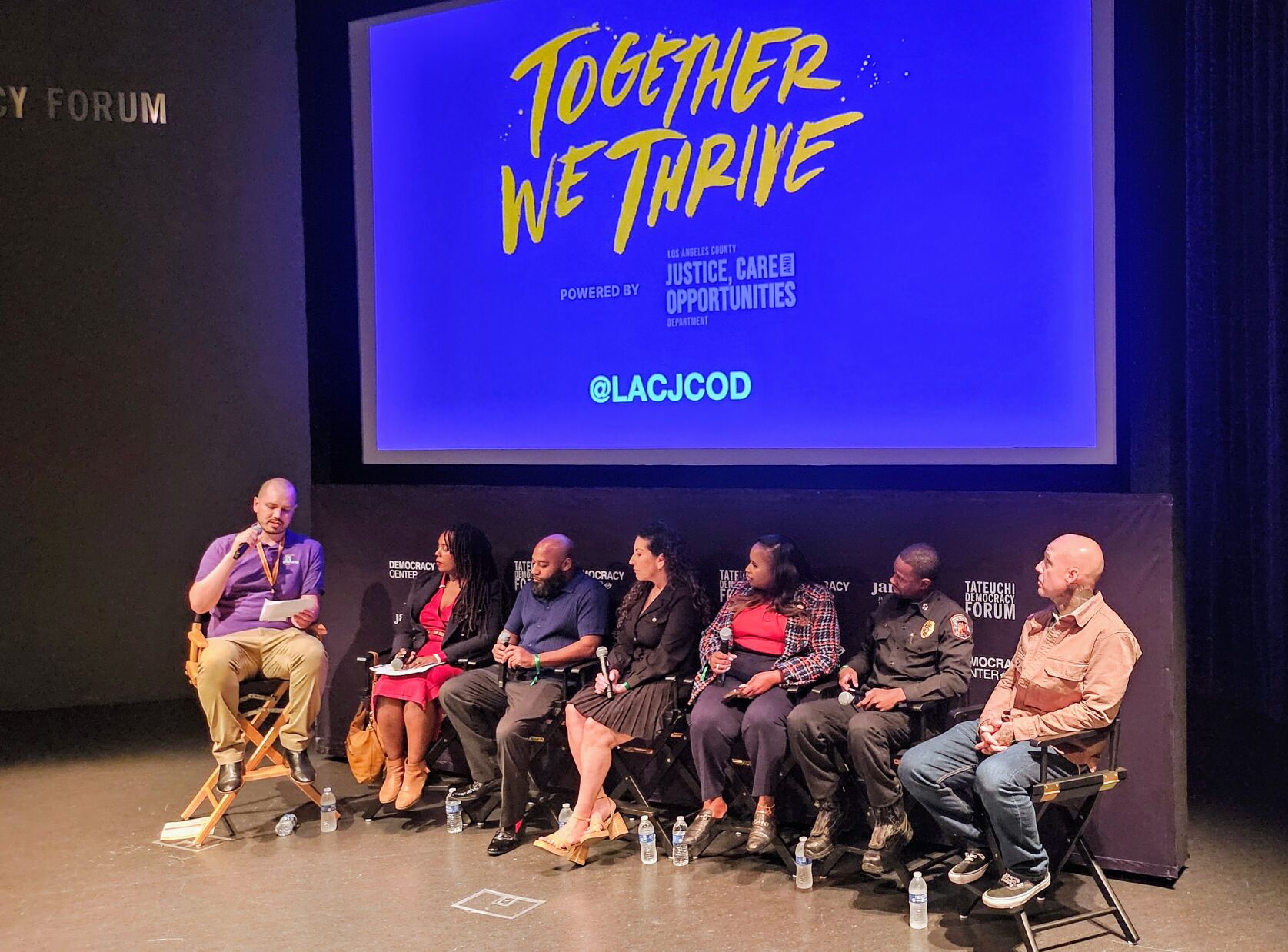
Panel at the “Together We Thrive 2024 Summit and Festival.” (Jacqueline García)
“There is a lot of young people here that have had lived experienced [in jail], and we have to put them to work, help them heal, and provide the services that the county needs to do,” she said.
Solis said it is now more than ever important to provide the needed resources because of some of the propositions appearing on the November ballot, like Proposition 36, a tough-on-crime ballot that would increase penalties.
“What that is going to do to our carceral system is put more people in jail. Who is going to pay for all that?” Solis said. “Instead of creating livelihood, creating opportunities for people to get education, rehabilitation, mental services, substance abuse, that’s what we need now.”
Royal Ramey, from the Forestry and Fire recruitment program, agreed with Solis during the panel “Reimagining Our Workforce and Housing Priorities.” He said that with the annual amount spent on each prisoner, he would instead create a fund to figure out how to rehabilitate people.
He said his program received a $3.7 million grant two years ago to provide formerly incarcerated people with opportunities to join the fire service. He said it is now more important than ever because of a labor shortage in wildland firefighting.
“We have folks in prison getting the training but not receiving the certifications or even roadmap to become firefighters, so that’s why we are so excited about our organization collaborating with JCOD,” said Ramey.
JCOD Director Judge Songhai Armstead said JCOD is committed to supporting and equipping individuals to become the heroes of their own stories. The connections and conversations at the event will help build a stronger network of JCOD Ambassadors.
“Our strength lies in our unity and willingness to listen, learn from each other, innovate, and persist in the face of adversity,” she said in her welcoming remarks.

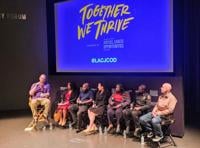
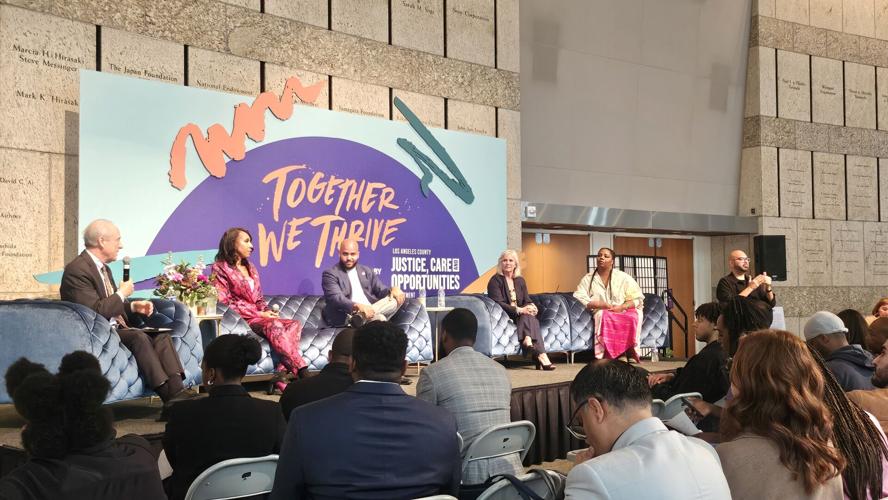

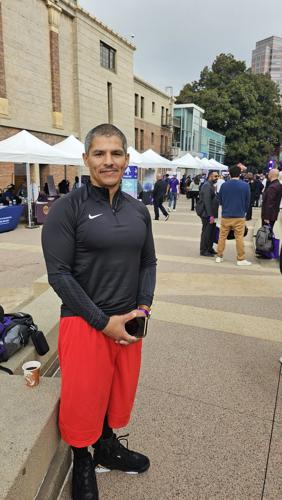
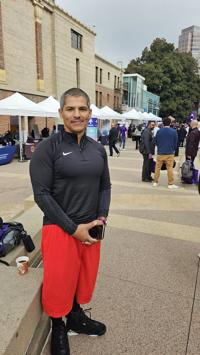
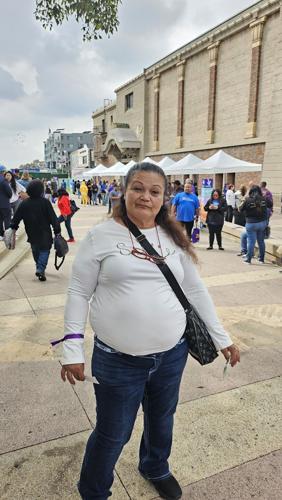
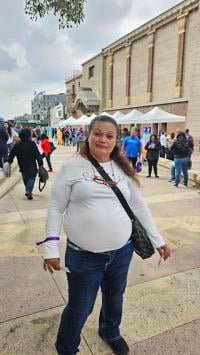







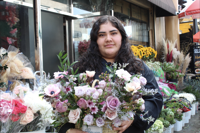
(0) comments
Welcome to the discussion.
Log In
Keep it Clean. Please avoid obscene, vulgar, lewd, racist or sexually-oriented language.
PLEASE TURN OFF YOUR CAPS LOCK.
Don't Threaten. Threats of harming another person will not be tolerated.
Be Truthful. Don't knowingly lie about anyone or anything.
Be Nice. No racism, sexism or any sort of -ism that is degrading to another person.
Be Proactive. Use the 'Report' link on each comment to let us know of abusive posts.
Share with Us. We'd love to hear eyewitness accounts, the history behind an article.